

Nerva–Antonine dynasty. The Nerva–Antonine dynasty was a dynasty of seven Roman Emperors who ruled over the Roman Empire from 96 AD to 192 AD.
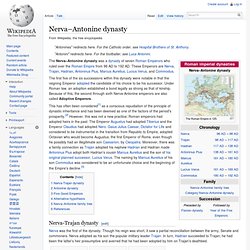
These Emperors are Nerva, Trajan, Hadrian, Antoninus Pius, Marcus Aurelius, Lucius Verus, and Commodus. The first five of the six successions within this dynasty were notable in that the reigning Emperor adopted the candidate of his choice to be his successor. Under Roman law, an adoption established a bond legally as strong as that of kinship. Because of this, the second through sixth Nerva-Antonine emperors are also called Adoptive Emperors. This has often been considered[1] as a conscious repudiation of the principle of dynastic inheritance and has been deemed as one of the factors of the period's prosperity.[2] However, this was not a new practice; Roman emperors had adopted heirs in the past: The Emperor Augustus had adopted Tiberius and the Emperor Claudius had adopted Nero. Nerva. Nerva (Latin: Marcus Cocceius Nerva Caesar Augustus;[1] 8 November, 30 AD – 27 January, 98 AD), was Roman Emperor from 96 to 98.
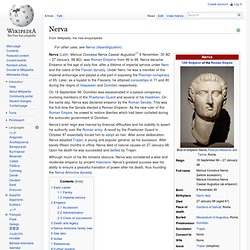
Nerva became Emperor at the age of sixty-five, after a lifetime of imperial service under Nero and the rulers of the Flavian dynasty. Under Nero, he was a member of the imperial entourage and played a vital part in exposing the Pisonian conspiracy of 65. Later, as a loyalist to the Flavians, he attained consulships in 71 and 90 during the reigns of Vespasian and Domitian respectively. On 18 September 96, Domitian was assassinated in a palace conspiracy involving members of the Praetorian Guard and several of his freedmen.
On the same day, Nerva was declared emperor by the Roman Senate. Trajan. Trajan (English pronunciation: /ˈtreɪdʒən/; Latin: Imperator Caesar Nerva Traianus Divi Nervae filius Augustus;[1] 18 September 53 – 9 August 117 AD) was Roman emperor from 98 AD until his death.
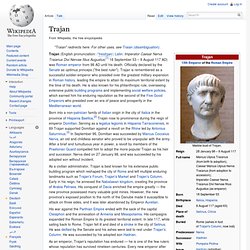
Officially declared by the Senate as optimus princeps ("the best ruler"), Trajan is remembered as a successful soldier-emperor who presided over the greatest military expansion in Roman history, leading the empire to attain its maximum territorial extent by the time of his death. He is also known for his philanthropic rule, overseeing extensive public building programs and implementing social welfare policies, which earned him his enduring reputation as the second of the Five Good Emperors who presided over an era of peace and prosperity in the Mediterranean world.
As a civilian administrator, Trajan is best known for his extensive public building program which reshaped the city of Rome and left multiple enduring landmarks such as Trajan's Forum, Trajan's Market and Trajan's Column. Hadrian. Hadrian (Latin: Publius Aelius Hadrianus Augustus[note 1][2][note 2] 24 January, 76 AD – 10 July, 138 AD) was Roman Emperor from 117 to 138.
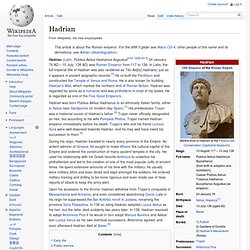
In Latin, the full imperial title of Hadrian was also rendered as Tito Ael[io] Hadriano, just as it appears in ancient epigraphic records.[3] He re-built the Pantheon and constructed the Temple of Venus and Roma. He is also known for building Hadrian's Wall, which marked the northern limit of Roman Britain. Hadrian was regarded by some as a humanist and was philhellene in most of his tastes.
He is regarded as one of the Five Good Emperors. Hadrian was born Publius Aelius Hadrianus to an ethnically Italian family, either in Italica near Santiponce (in modern-day Spain).[1] His predecessor Trajan was a maternal cousin of Hadrian's father.[4] Trajan never officially designated an heir, but according to his wife Pompeia Plotina, Trajan named Hadrian emperor immediately before his death. Antoninus Pius.
Early life[edit] Childhood and family[edit] He was born as the only child of Titus Aurelius Fulvus, consul in 89[3] whose family came from Nemausus (modern Nîmes).[6] He was born near Lanuvium[7] and his mother was Arria Fadilla.

Antoninus’ father and paternal grandfather died when he was young and he was raised by Gnaeus Arrius Antoninus,[3] his maternal grandfather, reputed by contemporaries to be a man of integrity and culture and a friend of Pliny the Younger. His mother married Publius Julius Lupus (a man of consular rank) suffect consul in 98, and two daughters, Arria Lupula and Julia Fadilla, were born from that union.[8] Marriage and children[edit] Some time between 110 and 115, he married Annia Galeria Faustina the Elder.[1] They are believed to have enjoyed a happy marriage. Faustina bore Antoninus four children, two sons and two daughters.[9] They were: Marcus Aurelius. Roman emperor from 161 to 180, philosopher Roman emperor Marcus Aurelius Antoninus ( ə-REE-lee-əs;[2] Latin: [ˈmaːrkʊs̠ au̯ˈreːlijʊs̠ an̪t̪oːˈniːnʊs̠]; 26 April 121 – 17 March 180) was Roman emperor from 161 to 180 and a Stoic philosopher.
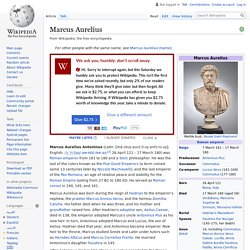
He was the last of the rulers known as the Five Good Emperors (a term coined some 13 centuries later by Niccolò Machiavelli), and the last emperor of the Pax Romana (27 BC to 180), an age of relative peace and stability for the Roman Empire. He served as Roman consul in 140, 145, and 161. Unlike some of his predecessors, Marcus chose not to adopt an heir.